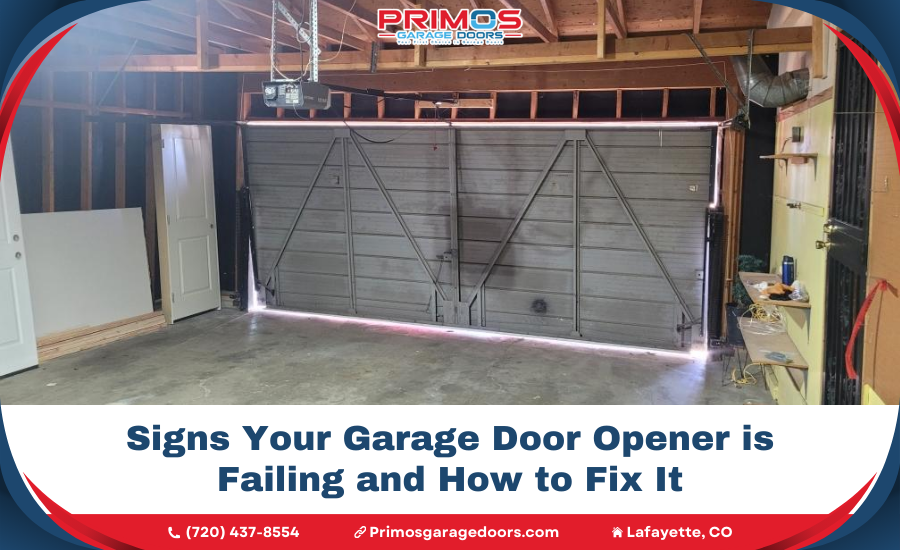Have you ever found yourself standing in front of your garage, pressing the remote repeatedly, only to be met with silence? This frustrating scenario is a common experience for many homeowners and could be one of the key signs your garage door opener is failing. Recognizing these signs early can save you from unexpected inconveniences and costly repairs.
In this article, we’ll dive into the critical signs your garage door opener is failing and what you can do about it. Here’s a sneak peek of what you’ll learn:
- Common Symptoms: Discover the tell-tale signs like unusual noises and erratic movements that indicate your garage door opener is on its last legs.
- Diagnostic Tips: Learn how to troubleshoot common issues and determine whether they can be fixed or if a replacement is necessary.
- Upgrade Benefits: Understand the advantages of installing a modern garage door opener, from enhanced security features to quieter operation.
- Maintenance Tips: Get practical advice on how to maintain your garage door opener to extend its lifespan and ensure smooth operation.
- Professional Help: Know when it’s time to call in the experts for a thorough inspection and reliable solutions.
By the end of this guide, you’ll be equipped with the knowledge to identify the early signs of a failing garage door opener and the steps to take to keep your garage functioning smoothly. Don’t let a malfunctioning opener disrupt your day-to-day life—read on to learn how to stay ahead of potential problems and maintain the convenience and security of your home.
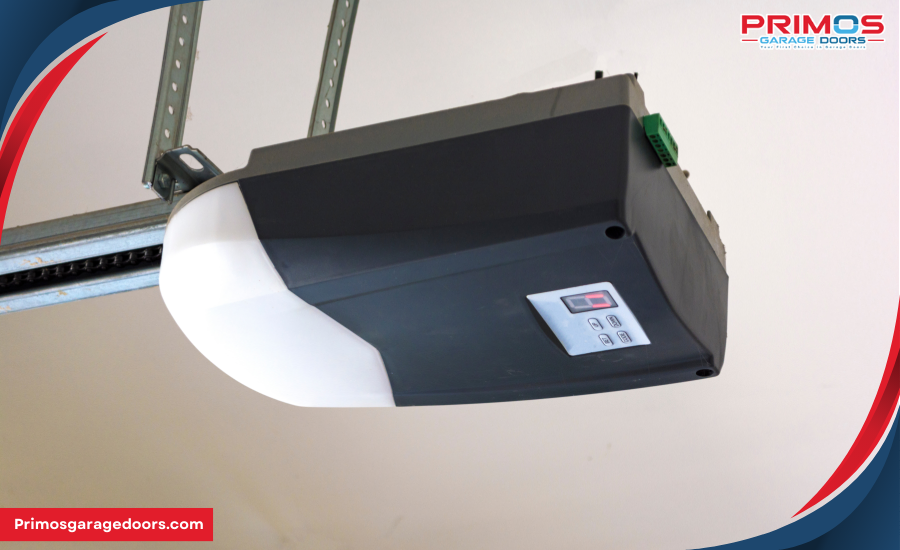
How Long Do Garage Door Openers Last?
Understanding the lifespan of your garage door opener is crucial for ensuring the smooth operation of your garage. On average, garage door openers last between 10-15 years. However, their longevity can vary based on several factors, including usage patterns, environmental conditions, and maintenance practices.
Typical Lifespan
Most garage door openers are built to last around 10-15 years. This range is an average estimate and can be influenced by how frequently the opener is used and how well it is maintained. High-quality models from reputable brands often reach or even exceed this lifespan, especially with regular care.
- Usage Frequency: Openers used multiple times a day will wear out faster than those used less frequently. Each opening and closing cycle adds wear and tear to the mechanical components.
- Quality of the Opener: Investing in a high-quality garage door opener can also extend its lifespan. Premium models are generally built with more durable materials and advanced technology that can withstand heavy use.
- Installation Quality: Proper installation by professionals ensures that the opener operates smoothly and reduces the likelihood of premature wear.
Factors Influencing Lifespan
Several factors can significantly impact the lifespan of your garage door opener. Understanding these can help you take better care of your opener and potentially extend its operational life.
- Frequency of Use
- Daily Use: An opener used multiple times a day will have a shorter lifespan compared to one used sparingly. Each cycle (one full opening and closing) causes wear on the opener’s motor and moving parts.
- Seasonal Use: In homes where the garage door is used less frequently, the opener may last longer due to reduced wear and tear.
- Environmental Conditions
- Weather Impact: Extreme weather conditions, such as intense heat, cold, or humidity, can affect the performance and longevity of the garage door opener. For instance, excessive moisture can lead to rusting of metal parts.
- Dust and Debris: Garages that are prone to dust and debris can cause additional wear on the opener’s components. Regular cleaning helps mitigate this issue.
- Maintenance Practices
- Regular Inspections: Conducting regular visual inspections can help identify issues like frayed wires, worn-out gears, or misaligned sensors before they become serious problems.
- Lubrication: Keeping moving parts well-lubricated reduces friction and wear, contributing to a longer lifespan. Using the correct type of lubricant is essential to avoid damage.
- Professional Servicing: Scheduling periodic maintenance with a professional can catch and fix small issues early. Technicians can perform detailed checks and ensure that all components are functioning correctly.
Maintenance Tips to Extend Lifespan
Regular maintenance is key to extending the life of your garage door opener. Here are some practical tips:
- Lubricate Moving Parts: Regularly lubricate the chain or belt, as well as the rollers, hinges, and tracks. This reduces friction and prevents wear.
- Check and Replace Batteries: Ensure that the remote control and backup batteries are always in good condition.
- Test Safety Features: Periodically test the auto-reverse and other safety features to ensure they are functioning correctly. This not only ensures safety but also keeps the opener in good working condition.
- Clean Sensors: Keep the safety sensors free from dirt and debris to ensure they function correctly and prevent accidental reversals or failures to close.
How Do You Know When You Need a New Garage Door Opener?
Your garage door opener plays a crucial role in the security and convenience of your home. Recognizing the signs your garage door opener is failing can help you take action before it stops working altogether. Here are the key indicators:
1. Unusual Sounds
Grinding or Squeaking: If your garage door opener starts making grinding or squeaking noises, it could be a sign of trouble. These noises often indicate that some parts are wearing out.
- Possible Causes: Worn gears, loose parts, or motor issues can cause these sounds. Regular lubrication and maintenance can help, but persistent noises usually mean it’s time for a replacement.
2. Difficulty With Opening
Erratic Movement: A garage door that opens or closes erratically is a clear sign of a problem. It might start moving and then suddenly reverse or get stuck.
- Common Issues: This erratic behavior is often due to misaligned sensors, worn-out gears, or electrical faults. Checking the sensors and ensuring they are clean and properly aligned can sometimes solve the problem, but ongoing issues typically require professional intervention.
3. Unreliable Function
Intermittent Operation: If your garage door opener works intermittently, opening or closing only sometimes when you press the button, it indicates inconsistency.
- Potential Reasons: This can be due to wiring issues, interference from other electronic devices, or problems with the remote control. Replacing batteries in the remote or checking for signal interference can help, but persistent issues often point to a failing opener that needs replacement.
4. Outdated Technology
Lack of Modern Features: Older garage door openers lack the modern features found in newer models. These features include smart connectivity, improved security mechanisms, and better energy efficiency.
Advantages of Upgrading: Upgrading to a new opener can offer enhanced performance and safety features. Smart openers allow for remote operation via smartphone apps, providing convenience and security. Newer models also come with advanced safety features like automatic reverse and motion detection, making your garage safer.
Key Indicators of a Failing Garage Door Opener
Recognizing these signs early can save you from sudden breakdowns and ensure your garage door operates smoothly. Here’s a quick reference:
- Grinding or Squeaking Noises: Worn gears or motor issues.
- Erratic Movement: Misaligned sensors or electrical faults.
- Intermittent Operation: Wiring issues or remote control problems.
- Lack of Modern Features: No smart connectivity, poor energy efficiency, or outdated safety mechanisms.
6 Benefits of Upgrading Your Garage Door Opener
Upgrading your garage door opener can significantly enhance your home’s convenience, security, and overall functionality. Here are six compelling reasons to consider making the switch to a modern garage door opener.
1. No More Remotes
Smartphone Control: One of the standout features of modern garage door openers is the ability to control them via smartphone apps. This eliminates the need for traditional remotes, providing a new level of convenience.
- Convenience: With smartphone control, you can open or close your garage door from anywhere, whether you’re at work, running errands, or even on vacation.
- Integration: These apps often integrate with other smart home systems, allowing you to monitor and control various aspects of your home from a single interface.
2. Reinforced Security
Advanced Security Features: Modern garage door openers come equipped with advanced security features that offer enhanced protection for your home.
- Rolling Code Technology: This technology changes the access code every time the remote is used, making it nearly impossible for intruders to gain entry by guessing the code.
- Monitoring Systems: Some openers include built-in cameras and monitoring systems that let you see who is accessing your garage, adding an extra layer of security.
3. Additional Safety
Enhanced Safety Mechanisms: Safety is a top priority with new garage door openers. They come with features designed to prevent accidents and ensure smooth operation.
- Auto-Reverse Function: This safety feature causes the garage door to automatically reverse if it encounters an obstruction while closing, preventing injuries and damage.
- Motion Detection: Motion sensors can detect movement near the garage door, stopping the door from closing if something or someone is in the way.
4. Noise Reduction
Quieter Operation: Modern garage door openers are designed to operate more quietly than older models, making them ideal for homes where the garage is close to living spaces.
- Belt Drive Systems: Unlike the traditional chain drive systems, belt drive openers use a rubber belt to move the door, significantly reducing noise.
- Advanced Motors: Newer models use motors that operate smoothly and quietly, minimizing the disruption to your home environment.
5. Less Maintenance & More Convenience
Low Maintenance: New garage door openers are built to require less maintenance, saving you time and effort.
- Durable Materials: Modern openers are made with high-quality, durable materials that reduce the need for frequent repairs.
- Self-Diagnostic Features: Some models come with self-diagnostic features that alert you to any issues before they become major problems, ensuring the opener stays in good working condition.
Convenient Features: Upgrading your opener introduces several convenient features that enhance the overall functionality of your garage.
- Battery Backup: In case of a power outage, a battery backup ensures that your garage door can still be operated, providing peace of mind.
- Automatic Lighting: Integrated lights that turn on automatically when the garage door is operated help illuminate your garage, improving visibility and safety.
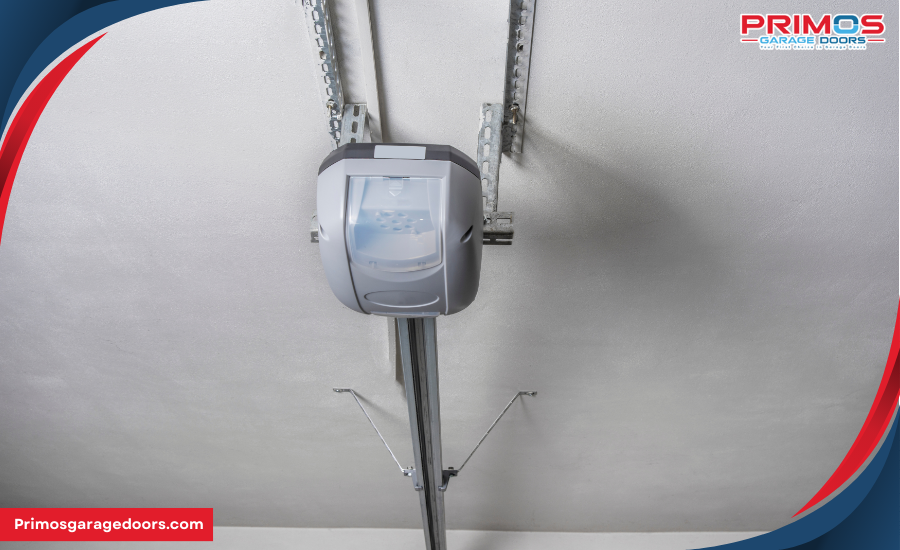
Summary of Benefits
Upgrading to a modern garage door opener offers numerous advantages, from enhanced security and safety features to convenience and low maintenance. Whether you want to enjoy the benefits of smartphone control or ensure your garage operates quietly and efficiently, a new opener is a worthwhile investment for any homeowner.
Garage Door Won’t Open or Close
A garage door that won’t open or close is a frustrating issue that many homeowners face. Understanding the common causes and solutions can save you time and prevent unnecessary repairs. Here are some immediate checks and solutions to consider.
Immediate Checks
- Power Supply
- Check the Opener: Ensure that the garage door opener is plugged in. Sometimes, a simple unplugged opener can be the cause of the problem.
- Circuit Breaker: Verify that the circuit breaker hasn’t tripped. If it has, resetting it may restore power to your opener.
- Remote Control
- Battery Check: Test the batteries in your remote control. Replace them if they are dead or weak.
- Range Issues: Ensure you are within the operating range of the garage door opener. Sometimes being too far away can cause the door not to respond.
- Manual Lock
- Engaged Lock: Check if the manual lock on the garage door is engaged. Disengaging it can allow the door to function normally again.
Common Solutions
Sensor Alignment
- Check Sensors: The safety sensors at the bottom of the garage door tracks must be aligned and clean. Dirt or misalignment can cause the door to stop closing.
- Cleaning Sensors: Wipe the sensors with a clean cloth to ensure there is no dirt obstructing the sensor’s beam.
Obstructions in the Track
- Track Inspection: Inspect the tracks for any obstructions. Items like rocks, debris, or even small toys can prevent the door from closing properly.
- Clear the Track: Remove any obstructions to ensure smooth operation.
Limit Settings
- Adjust Limits: The garage door opener might have incorrect limit settings, which determine how far the door should move to close completely. Adjusting these settings can solve the issue.
- Consult Manual: Refer to your opener’s user manual for instructions on how to adjust the limit settings.
Spring or Cable Issues
- Inspect Springs: Broken or damaged torsion or extension springs can prevent the door from opening. If you notice a gap in the spring, it’s likely broken.
- Professional Help: Always call a professional to repair or replace springs as they are under high tension and can be dangerous to handle.
Disconnect Switch
- Reattach the Door: Sometimes, the garage door opener might be disconnected from the door. This can happen if the emergency release cord has been pulled. Reattaching the opener to the door can solve the problem.
Garage Door Troubleshooting Guide
| Issues | Immediate Checks | Common Solutions |
| No response from the opener | Check power supply and remote | Replace batteries, check circuit breaker |
| Door doesn’t close properly | Inspect and clean sensors | Align sensors, remove obstructions |
| Door won’t open | Check springs and cables | Call a professional for repairs |
| Door stuck halfway | Inspect track for obstructions | Clear any debris, adjust limit settings |
Regular maintenance, such as keeping the tracks clean and ensuring the sensors are aligned, can prevent many of these problems from occurring. If these solutions don’t resolve the issue, it may be time to call a professional for a thorough inspection and repair.
Garage Door Works Intermittently
When your garage door works intermittently, it can be a frustrating and inconvenient problem. This inconsistency often signals a failing garage door opener or underlying electrical issues. Understanding the potential causes and knowing how to address them can save you time and ensure your garage door functions smoothly.
Inconsistent Operation
Intermittent operation is when your garage door opens or closes only some of the time, even though you press the remote button or wall switch correctly. This erratic behavior is a common sign of a failing opener, but it can also stem from other issues.
- Wiring Problems: Over time, the wires connecting your garage door opener to the power source and control units can become worn or damaged. This can lead to intermittent signals and unreliable performance.
- Remote Control Issues: If your remote control has weak or dying batteries, it can cause the door to respond inconsistently. Additionally, if the remote control is faulty or not transmitting properly, it can lead to similar issues.
- Sensor Misalignment: The safety sensors at the bottom of your garage door tracks must be perfectly aligned to function correctly. Misaligned sensors can cause the door to stop and reverse unexpectedly, contributing to intermittent operation.
- Interference: Electronic interference from other devices, such as cordless phones, baby monitors, or even some lighting systems, can disrupt the signal between your remote and the opener, causing inconsistent operation.
Potential Fixes
Here are some steps you can take to address the issue of an intermittently working garage door opener:
- Check Wiring Connections
- Inspect Connections: Ensure that all wires are securely connected and free from damage. Look for frayed wires or loose connections at the opener, wall switch, and power source.
- Replace Damaged Wires: If you find any damaged or worn wires, replace them immediately to restore consistent operation.
- Replace Remote Batteries
- Battery Replacement: If your garage door remote is not working reliably, try replacing the batteries. This simple fix often resolves intermittent operation issues.
- Test Range: After replacing the batteries, test the remote from various distances to ensure it works consistently within the expected range.
- Realign Safety Sensors
- Check Sensor Alignment: Ensure the safety sensors at the base of the garage door tracks are properly aligned. Misalignment can cause the door to stop or reverse unexpectedly.
- Clean the Sensors: Dirt or debris on the sensor lenses can obstruct the infrared beam, causing intermittent operation. Clean the lenses with a soft cloth.
- Reduce Electronic Interference
- Identify Interference Sources: Determine if any nearby electronic devices could be causing interference with your garage door opener’s signal. Common culprits include cordless phones, Wi-Fi routers, and certain types of lighting.
- Relocate Devices: Move these devices away from the garage door opener or consider using a different frequency for your remote if possible.
- Inspect and Maintain the Opener
- Lubricate Moving Parts: Regularly lubricate the opener’s chain or belt, as well as other moving parts, to ensure smooth operation and reduce wear.
- Tighten Loose Components: Check for any loose bolts or screws on the opener and tighten them to prevent vibrations and ensure stable performance.
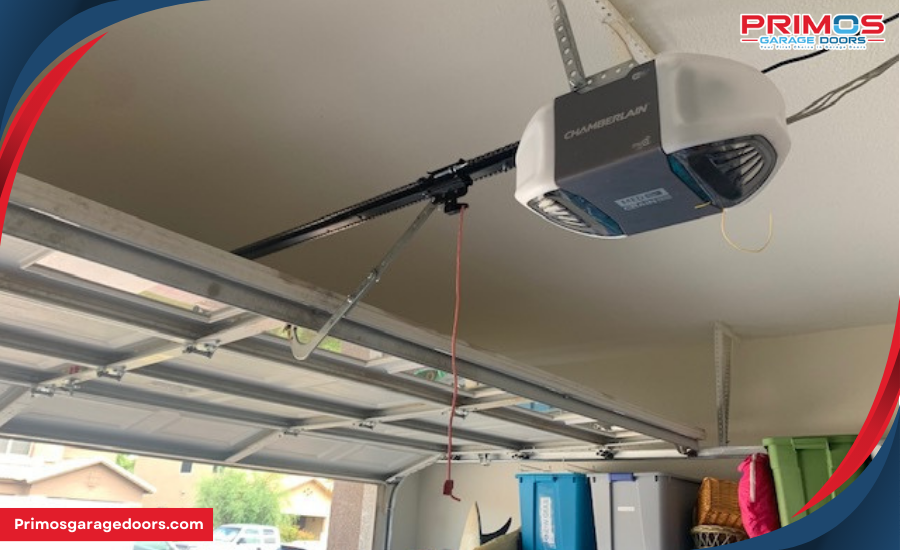
Solving Garage Door Opener Signal Issues
| Issues | Checks | Solutions |
| Intermittent door response | Remote battery strength | Replace batteries in remote control |
| Door stops and reverses | Sensor alignment and cleanliness | Realign and clean safety sensors |
| Inconsistent operation signals | Wiring connections | Inspect and replace damaged wires |
| Signal interference | Nearby electronic devices | Relocate devices or change remote frequency |
Garage Door Opens Then Reverses
One of the more perplexing issues homeowners face is when their garage door opens then reverses. This behavior can be a sign of safety sensor issues. These sensors are designed to prevent the door from closing on an obstruction, but when they malfunction, they can cause the door to reverse unexpectedly. Here’s how to troubleshoot and fix this problem.
Safety Sensor Issues
Misaligned Sensors: The most common cause of garage door reversing is misaligned safety sensors. These sensors, located near the bottom of the garage door tracks, send an infrared beam to each other. If something disrupts this beam, the door will reverse to prevent closing on an obstruction.
- Symptoms of Misalignment: If the sensors are out of alignment, they won’t be able to communicate properly. This can happen if one or both sensors are bumped or moved. When this occurs, the door might start to close, then reverse.
Dirty Sensors: Dirt, dust, or cobwebs on the sensor lenses can block the infrared beam, causing the door to reverse. Keeping the sensors clean ensures they function correctly.
- Symptoms of Dirty Sensors: If your garage door closes partially and then reverses, it’s often because the sensors are dirty. This can be resolved with simple cleaning.
Obstructions: Sometimes, objects in the path of the sensors can cause the door to reverse. This is a safety feature but can be triggered by small or overlooked items.
- Common Obstructions: Check for any items like toys, tools, or debris that could be blocking the sensors.
Troubleshooting Tips
Here are some steps you can take to troubleshoot and resolve sensor issues:
- Check Sensor Alignment
- Visual Inspection: Look at the sensors to see if they are facing each other directly. They should be aligned and not tilted.
- Adjust Alignment: If the sensors are misaligned, gently adjust them until they are pointing directly at each other. Most sensors have indicator lights that will glow steadily when properly aligned.
- Clean the Sensors
- Wipe Lenses: Use a soft cloth to wipe the sensor lenses. This removes dust, dirt, or cobwebs that might be obstructing the infrared beam.
- Routine Cleaning: Regularly clean the sensors to prevent build-up that could cause future issues.
- Remove Obstructions
- Clear Path: Ensure there are no objects blocking the sensors. Even small items can interfere with the beam.
- Maintain Clear Area: Keep the area around the sensors free of debris and objects.
- Check Sensor Wiring
- Inspect Wires: Look for any loose or damaged wires connecting the sensors to the garage door opener. Reconnect or replace wires as needed.
- Test Connection: Ensure the wires are securely connected and there is no corrosion at the connections.
- Test the Sensors
- Close Door: Press the close button on your garage door opener. If the door still reverses, there may be a deeper issue.
- Professional Help: If you’ve tried these steps and the door continues to reverse, it might be time to call a professional. They can perform a more thorough inspection and fix any complex problems.
Troubleshooting Common Garage Door Sensor Problems
| Issues | Checks | Solutions |
| Door reverses when closing | Sensor alignment | Adjust sensors until indicator lights are steady |
| Door closes partially then reverses | Dirty sensor lenses | Clean lenses with a soft cloth |
| Door reverses unexpectedly | Obstructions in the sensor path | Remove objects blocking the sensors |
| Door reverses with no visible cause | Sensor wiring | Inspect and secure all sensor connections |
Garage Door Opener Makes Unusual Noises
When your garage door opener makes unusual noises, it’s a clear sign that something may be wrong. Identifying these noises and understanding their causes can help you troubleshoot and fix issues before they lead to more significant problems. Here’s a breakdown of common noise types and their causes, along with maintenance tips to keep your opener running smoothly.
Noise Types and Causes
- Grinding Noises
- Worn Gears: Grinding noises often indicate that the gears inside the garage door opener are worn out. Over time, the gears can become stripped or damaged, leading to this harsh sound.
- Motor Problems: If the motor is struggling to operate, it might produce a grinding noise. This can be due to old age or internal motor issues.
- Squeaking Sounds
- Dry or Unlubricated Parts: Squeaking usually happens when moving parts like the chain, belt, or rollers are dry and need lubrication.
- Worn Out Bearings: Bearings in the motor or pulley system can wear out, causing a high-pitched squeak.
- Rattling and Banging
- Loose Hardware: Rattling noises often come from loose nuts, bolts, or screws. The vibrations during the operation of the garage door opener can cause these components to rattle.
- Misaligned Tracks: If the tracks are not aligned correctly, the door can bang against them, creating a loud noise.
- Humming Sounds
- Motor Issues: A humming sound typically indicates that the motor is receiving power but is not turning. This could be due to a jammed or faulty motor.
- Capacitor Problems: The capacitor helps start the motor. If it’s failing, you might hear a humming noise when the opener tries to operate.
Maintenance Tips
Regular maintenance can prevent many of the issues that cause unusual noises. Here are some tips to keep your garage door opener in good working condition:
- Lubricate Moving Parts
- Lubricate Regularly: Apply a suitable lubricant to the chain or belt, rollers, hinges, and other moving parts every six months. This reduces friction and prevents squeaking.
- Use the Right Lubricant: Use a silicone-based lubricant or a specific garage door lubricant rather than WD-40, which can attract dirt.
- Tighten Loose Components
- Inspect and Tighten: Regularly inspect the opener’s hardware, including the track brackets, bolts, and screws. Tighten any loose components to prevent rattling and ensure smooth operation.
- Check the Tracks: Ensure the tracks are properly aligned and secure. Misaligned tracks can cause the door to bind and create banging noises.
- Inspect and Replace Worn Parts
- Check Gears and Bearings: Periodically check the condition of the gears and bearings. If you notice wear, replace them before they cause more damage.
- Replace Worn Rollers: If the rollers are worn out, replace them with new ones. Nylon rollers are quieter and require less maintenance than metal ones.
- Motor and Electrical Components
- Test the Motor: Listen for any unusual sounds coming from the motor. If you hear grinding or humming, it might be time to replace it.
- Check the Capacitor: If your opener is making a humming noise but not operating, the capacitor might need replacing. This is a task best left to professionals.
- Routine Professional Maintenance
- Annual Inspection: Schedule an annual inspection with a professional. They can identify and fix issues you might overlook, ensuring your opener remains in top condition.
- Professional Repairs: For significant repairs like motor or gear replacement, always consult a professional to avoid injury and ensure the job is done correctly.
Maintenance Schedule and Toolkit Guide
| Maintenance Task | Frequency | Tools Needed |
| Lubricate moving parts | Every 6 months | Silicone-based lubricant |
| Tighten loose components | Every 3 months | Wrench set, screwdriver |
| Inspect and replace worn parts | Annually | Various (depends on part) |
| Check motor and electrical components | Annually | Multimeter, visual inspection |
| Professional maintenance | Annually | Professional service call |
Regular maintenance not only prevents unusual noises but also extends the lifespan of your garage door opener. By addressing issues early and keeping parts well-maintained, you can ensure your garage door operates quietly and efficiently. If you encounter persistent problems, don’t hesitate to seek professional assistance.
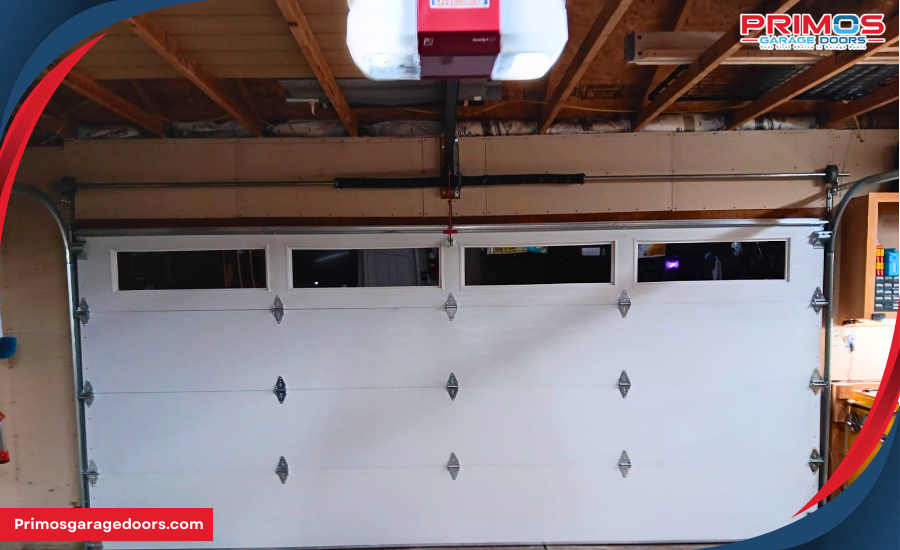
Garage Door Opener is an Older Model
Having an older garage door opener can significantly impact the performance and reliability of your garage door system. Understanding how age affects these devices and knowing when to replace them can save you from unexpected failures and improve the overall functionality and security of your home.
Age and Performance
Wear and Tear: Over time, the mechanical components of a garage door opener experience wear and tear. Parts like gears, belts, and chains can deteriorate, leading to inefficiency and potential failure. As these parts wear out, the opener may struggle to lift the door, operate more slowly, or make unusual noises.
Outdated Technology: Older models lack modern features that enhance safety, security, and convenience. For example, early garage door openers might not have rolling code technology, which prevents code grabbing by automatically changing the access code after each use. Additionally, they might not support smartphone control, making it less convenient to operate the door remotely.
Decreased Efficiency: An old garage door opener can be less energy-efficient compared to newer models. Older motors consume more power and can overheat, reducing their lifespan and reliability. This inefficiency not only affects performance but also increases electricity bills.
Safety Concerns: Safety standards for garage door openers have evolved significantly. Older models might lack essential safety features such as auto-reverse mechanisms and motion detectors. These features are crucial in preventing accidents and ensuring the door reverses if it detects an obstruction.
When to Replace
Recognizing the signs that indicate it’s time to replace your garage door opener is essential for maintaining a reliable and safe garage door system. Here are some key indicators:
- Frequent Breakdowns
- Increasing Repairs: If your opener requires frequent repairs, it might be more cost-effective to replace it with a new, more reliable model. Frequent breakdowns indicate that the components are wearing out and the system is failing.
- Inconsistent Performance
- Erratic Operation: If your garage door opener operates inconsistently, such as opening or closing intermittently or reversing direction unexpectedly, it might be a sign that the system is failing. This erratic behavior can be due to worn-out parts or outdated technology.
- Lack of Modern Features
- Smart Technology: If your current opener does not support smartphone control or integration with other smart home devices, it might be time to upgrade. Modern openers offer features like remote access, notifications, and enhanced security settings.
- Improved Security: Newer models come with advanced security features such as rolling code technology and monitoring systems that can alert you to unauthorized access attempts.
- Noisy Operation
- Loud Noises: Older openers often make more noise during operation due to worn-out gears or outdated drive mechanisms. If your opener is loud and disruptive, upgrading to a quieter, belt-driven model can significantly improve the comfort of your home environment.
- Increased Energy Consumption
- High Energy Bills: If you notice a spike in your energy bills, your garage door opener might be the culprit. Newer models are designed to be more energy-efficient, helping you save on electricity costs while reducing your environmental footprint.
- Safety Concerns
- Missing Safety Features: If your opener lacks modern safety features like auto-reverse and motion detection, it’s crucial to replace it to ensure the safety of your family and property. These features are now standard in new models and are essential for preventing accidents and injuries.
Signs Your Garage Door Opener Needs Upgrading
| Indicator | Description | Action Needed |
| Frequent Breakdowns | Requires constant repairs | Replace with a new model |
| Inconsistent Performance | Erratic opening and closing | Consider an upgrade |
| Lack of Modern Features | No smartphone control or advanced security | Upgrade to a smart opener |
| Noisy Operation | Loud and disruptive noises | Switch to a quieter model |
| Increased Energy Consumption | Higher electricity bills | Opt for an energy-efficient opener |
| Safety Concerns | Missing auto-reverse and motion detection | Install a safer, modern opener |
Upgrading your garage door opener to a newer model with advanced features can enhance the security, convenience, and efficiency of your home. Regular maintenance and timely replacements ensure your garage door opener remains reliable and safe, providing peace of mind and improved functionality. If you’re experiencing any of these issues, it’s time to consider investing in a modern garage door opener.
Other Common Opener Difficulties and Solutions
Apart from the major issues like garage door opener failures and safety sensor problems, homeowners often face several other common difficulties. Addressing these problems promptly can save time and money. Here’s a guide to some of the most frequent issues and their simple, DIY solutions.
Common Issues
- Remote Control Failures
- Unresponsive Remote: One of the most common problems is a remote control that doesn’t work. This can be due to dead batteries, signal interference, or the remote being out of range.
- Signal Interference: Other electronic devices or nearby Wi-Fi routers can interfere with the remote’s signal, causing it to malfunction.
- Battery Issues
- Dead Batteries: Remote controls and wall units often fail because of dead or weak batteries. Replacing the batteries can resolve this issue.
- Backup Battery Failure: If your garage door opener has a backup battery, it can lose its charge over time, especially after frequent use during power outages.
- Wiring Problems
- Loose or Damaged Wires: Wires connecting the opener to the power source or sensors can become loose or damaged. This can disrupt the signal and prevent the opener from working properly.
- Corrosion: Over time, wires and connectors can corrode, leading to poor connections and operational issues.
- Track Obstructions
- Debris in Tracks: Small objects, dirt, or debris in the tracks can obstruct the movement of the garage door, causing it to stop or reverse direction.
- Misaligned Tracks: Tracks that are not aligned correctly can cause the door to bind, leading to operational problems.
- Motor Overheating
- Overuse: Continuous operation can cause the motor to overheat, especially in older models. This can lead to temporary shutdowns until the motor cools down.
- Poor Ventilation: Lack of proper ventilation around the opener can exacerbate overheating issues.
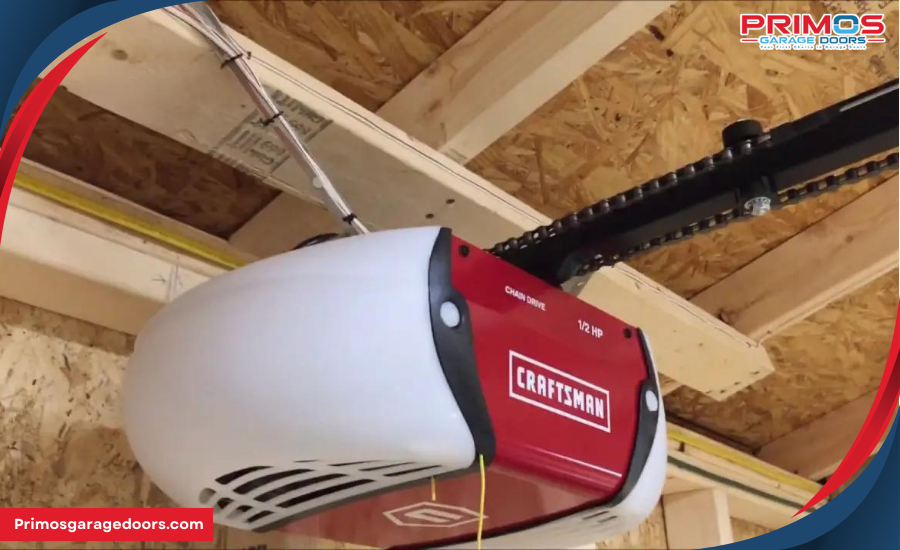
DIY Fixes
Here are some simple fixes that homeowners can try before calling a professional:
- Check and Replace Batteries
- Remote Control Batteries: Replace the batteries in your remote control if it’s not responding. Ensure you use the correct battery type for your remote.
- Wall Unit Batteries: If your wall unit is battery-operated, check and replace its batteries as well.
- Reposition the Remote and Reduce Interference
- Move Closer: Ensure you are within the effective range of your garage door opener. Move closer to the garage door and try again.
- Reduce Interference: Identify and reduce sources of interference. Move electronic devices and Wi-Fi routers away from the opener and remote control.
- Inspect and Repair Wiring
- Check Connections: Inspect all wires for loose connections or visible damage. Tighten loose connections and replace any damaged wires.
- Clean Corroded Contacts: Use a contact cleaner to clean corroded connectors. Ensure all connections are secure and free from corrosion.
- Clear Track Obstructions
- Remove Debris: Inspect the tracks for any debris or obstructions. Clear any items that could hinder the door’s movement.
- Realign Tracks: Check for proper alignment of the tracks. If they are misaligned, loosen the screws holding the tracks in place, adjust them until they are straight, and then retighten the screws.
- Prevent Motor Overheating
- Allow Cooling Time: If the motor overheats, allow it to cool down before operating the door again. This prevents further damage.
- Improve Ventilation: Ensure there is adequate ventilation around the garage door opener. Keep the area clear to allow for proper air circulation.
Troubleshooting Common Issues
| Issue | Symptom | DIY Solution |
| Remote Control Failures | Remote not responding | Replace batteries, move closer, reduce interference |
| Battery Issues | Opener not working during power outage | Replace backup battery |
| Wiring Problems | Opener intermittently failing | Inspect and repair loose or corroded wires |
| Track Obstructions | Door stops or reverses unexpectedly | Clear debris, realign tracks |
| Motor Overheating | Opener shuts down after use | Allow cooling time, improve ventilation |
What Are the Types of Garage Door Openers?
Choosing the right garage door opener depends on your specific needs, such as noise level, durability, and maintenance requirements. Understanding the different types of garage door openers can help you make an informed decision. Here are the three main types: chain drive openers, belt drive openers, and screw drive openers.
Chain Drive Openers
Durability: Chain drive openers are known for their durability and strength. They use a metal chain to lift and lower the garage door. This makes them an excellent choice for heavy or oversized doors, such as solid wood or double garage doors. They are built to last and can handle frequent use without significant wear and tear.
Noise Level: One downside to chain drive openers is the noise they produce. The metal chain moving along the metal track creates a lot of noise, which can be disruptive, especially if there are living spaces above or adjacent to the garage. However, advancements in technology have made some modern chain drive models quieter than older versions.
Cost: Chain drive openers are typically less expensive than other types. This makes them a popular choice for budget-conscious homeowners who still need a reliable and durable opener.
Belt Drive Openers
Quiet Operation: Belt drive openers are known for their quiet operation. Instead of a metal chain, they use a rubber belt, which significantly reduces noise. This makes them ideal for garages that are attached to living spaces or have bedrooms above them.
Suitability for Homes: The smooth and quiet operation of belt drive openers makes them perfect for homes where noise could be an issue. They provide a gentle and less intrusive sound, making the operation almost silent compared to chain drive openers.
Durability and Cost: While belt drive openers tend to be more expensive than chain drive models, they are also very durable. The rubber belt does not wear out as quickly as a metal chain, which means fewer maintenance issues and a longer lifespan. The initial investment can be higher, but the benefits of quieter and smoother operation often justify the cost.
Screw Drive Openers
Maintenance Requirements: Screw drive openers operate using a threaded steel rod (screw) to move the trolley that opens and closes the door. They have fewer moving parts compared to chain or belt drive openers, which means there is less that can go wrong. This translates to lower maintenance requirements and costs.
Performance in Different Climates: One potential downside of screw drive openers is their performance in extreme temperatures. In very hot or very cold climates, the screw can expand or contract, which may affect the smooth operation of the door. However, some modern screw drive models are designed to handle these temperature fluctuations better.
Speed: Screw drive openers are known for their speed. They can open and close a garage door faster than chain or belt drive openers, making them a good choice for those who prioritize quick operation.
Types of Garage Door Opener
| Type of Opener | Durability | Noise Level | Maintenance | Cost | Best For |
| Chain Drive Opener | Very durable | Noisy | Moderate | Affordable | Heavy doors, budget-conscious buyers |
| Belt Drive Opener | Durable | Quiet | Low | More expensive | Homes with attached living spaces |
| Screw Drive Opener | Durable, lower maintenance | Moderate | Low | Moderate | Faster operation, fewer moving parts |
Understanding these types of garage door openers can help you choose the one that best fits your needs. Whether you prioritize durability, quiet operation, or low maintenance, there is an opener designed to meet your requirements. If noise is a concern, a belt drive opener might be the best choice. For those looking for strength and affordability, chain drive openers are ideal. And if you need a fast and low-maintenance option, consider a screw drive opener. Always consider your specific needs and preferences when selecting a garage door opener to ensure it meets your expectations and requirements.
Ensuring Your Garage Door Opener’s Longevity and Performance
We’ve thoroughly examined the key indicators that signal a garage door opener may be failing and provided insights on how to resolve these issues. Common symptoms like unusual noises, erratic operation, and outdated technology were discussed, emphasizing the potential need for repairs or a complete replacement. The advantages of upgrading to a modern garage opener, including better security, quieter operation, and improved efficiency, were also highlighted. Additionally, we explored different types of garage door openers, such as chain drive, belt drive, and screw drive, outlining their benefits and suitability for various needs. To further assist you, we answered frequently asked questions to enhance your understanding of maintenance, troubleshooting, and the costs associated with replacing a garage door opener.
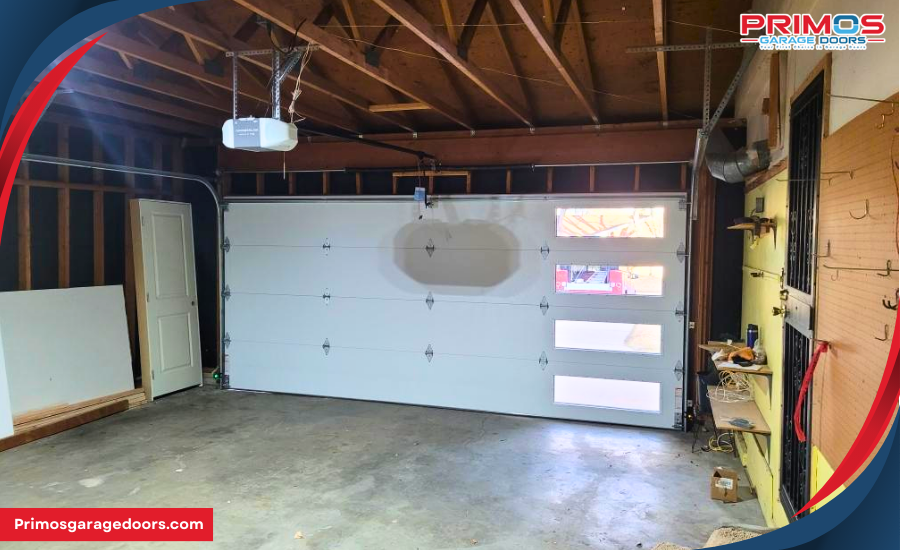
Frequently Asked Questions
How long do garage door openers typically last?
Garage door openers usually last between 10-15 years, depending on how often they are used and how well they are maintained. Regular maintenance, such as lubricating moving parts, checking and replacing worn-out components, and ensuring the opener is properly balanced, can extend the lifespan. High-quality models from reputable brands might even exceed this range, while heavy usage or neglect can shorten it. Keeping the system clean and performing routine checks are essential for maximizing longevity.
What are common problems with garage door openers?
Common problems with garage door openers include sensor malfunctions, which can cause the door to stop or reverse unexpectedly; motor problems, which might lead to the door not opening or closing; and electrical failures that can result in the opener not receiving power. Other issues include worn-out gears, misaligned tracks, and problems with remote controls. Regular maintenance and timely repairs can prevent these issues from escalating into more serious problems that require extensive repairs or replacements.
Can I repair my garage door opener myself?
Yes, you can handle basic repairs on your garage door opener yourself, such as replacing batteries in remote controls, lubricating moving parts, and aligning safety sensors. These simple tasks can keep the opener functioning smoothly and prevent minor issues from becoming major problems. However, for more complex problems like motor failures, broken springs, or significant electrical issues, it is best to call a professional. Attempting to fix these on your own can be dangerous and may lead to further damage.
How to know if a garage opener is bad?
To check if a garage opener is bad, start by examining if it’s making unusual noises or if it’s not responding to the remote or wall switch. Check if the lights on the opener are working properly. If the door moves unevenly or gets stuck, it could indicate a problem. Also, inspect the opener for any signs of physical damage or wear. If you’ve tried troubleshooting and the issues persist, it might be time to consult a professional for repair or replacement.
What are the benefits of a new garage door opener?
Upgrading to a new garage door opener offers several benefits, including enhanced security features such as rolling code technology that changes the access code after each use, reducing the risk of unauthorized entry. Newer models operate more quietly, making them ideal for homes with attached garages. They are also more energy-efficient and come with modern conveniences like smartphone control, allowing you to open and close your garage door remotely. Additionally, new openers often require less maintenance and provide smoother operation, improving the overall functionality of your garage door system.
Trust Primos Garage Doors for Expert Services in Lafayette
For homeowners in Lafayette, Primos Garage Doors offers comprehensive garage door opener services. Whether you need a professional inspection, maintenance, or a complete replacement, our experienced team is ready to help. Upgrading your garage door opener can enhance the security and functionality of your home, providing peace of mind and convenience.
Don’t wait until your garage door opener fails completely. Contact Primos Garage Doors today to schedule a professional inspection or to learn more about our maintenance and replacement services. Reach us at Primos Garage Doors or call us at (720) 437-8554. Our team is dedicated to ensuring your garage door operates smoothly and efficiently, keeping your home safe and secure.


